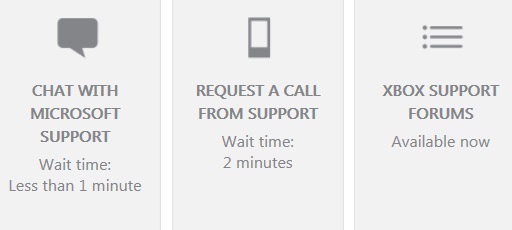
It came out yesterday that Facebook wants to buy WhatsApp, a well known instant messaging client used around the world. Let me count the ways this is a terrible thing. Continue reading “Why the Facebook acquisition of WhatsApp is BAD”

It came out yesterday that Facebook wants to buy WhatsApp, a well known instant messaging client used around the world. Let me count the ways this is a terrible thing. Continue reading “Why the Facebook acquisition of WhatsApp is BAD”

I had a relatively simple question about my Xbox Live account, earlier today, but the answer just wasn’t clear to me. So I hopped on the online and asked the support rep. I had an answer within minutes and was on to the next thing. Mark was a big help. But it got me thinking… I’ve contact Microsoft’s support team a few times in the last few years, and every time they’ve been a huge help. All too often when I call one company or another for support, they find a scape goat. “It must be your internet connection,” they’ll say, or “have you replaced the batteries?” I’ve been asked. Whether it’s for a few hundred dollars in a game console, or thousands of dollars on an enterprise server, I have to work with tech support all the time, and the Xbox Support team continues to deliver the best experience. Continue reading “Xbox Support Sets the Standard”
This blog post is actually quite personal, I’ve only told this story to a few people. It seemed weird to “brag” about the job I didn’t go for. But it seems like a good time to share my story. If you’re uncomfortable with oversharing, stop now. Continue reading “That time I almost worked for Microsoft as Xbox Support”

Everyone, say hello to Satya Nadella. He has just been named the new CEO of Microsoft. Only the third CEO in company history, Nadella has been with Microsoft for 22 years.
He is well known for his role on the enterprise end of the spectrum. Particularly, over the last quarter-decade, he has been responsible for a lot of what makes Azure a great cloud platform. He is credited with making sure the infrastructure, including the ability to run Windows Server, SQL Server, and Visual Studio within the cloud. His educational background is at The University of Chicago, where he attended the Booth School of Business. While at Microsoft, he was a Senior VP in MBS (focusing on Dynamics and Office Small Business), then the President of the Server & Tools business, which is when he was making his big cloud push.
This should give us a clear idea of what Nadella going to focus on. Does this mean he will jettison other divisions like Windows Phone and Xbox? Doubtful. But we will very likely see more cloud integration and dependence on making the Xbox a “service” rather than simply a gaming or entertainment platform. Software as a Service (SaaS) and the ability to charge monthly fees for products like Windows and Office have been a long time goal for Microsoft, generating a steady stream of revenue. As much as the consumer may not like it, the entire industry has been trying to go this way for years. We can expect to see a push in this direction, as I expect Nadella will dive in more quickly than his predecessors, who were dipping their toes in.
If you really want to get to know Satya Nadella, learn about him from his MSDN blogs of years past.